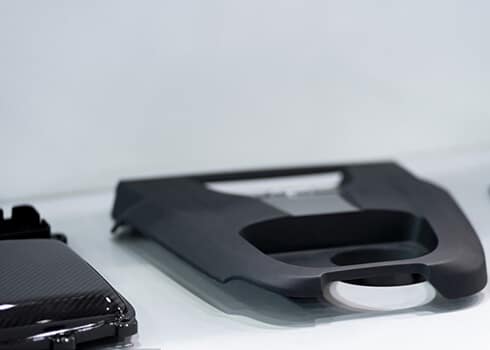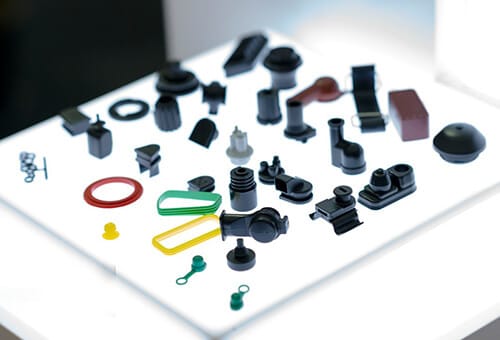CNC machined PVC parts are highly sought after in various industries due to the versatility and economic benefits of polyvinyl chloride. Runsom Precision specializes in designing and producing PVC machined parts for a range of industrial applications, such as automobile, marine, chemical, and fluid transmission. With our extensive experience and technology, we are a top choice for PVC CNC machining services.
CNC Machining in PVC

PVC, one of the most commonly utilized engineering plastics, has excellent environmental benefits because it requires fewer nonrenewable raw materials per volume than most other plastics, making it one of the greenest plastic alternatives available. When it comes to CNC machining, PVC behaves similarly to other engineering plastics, and its relatively easy machinability makes it an ideal substrate due to its rigidity and hardness.
PVC can be effectively machined using the CNC machining method, producing affordable parts with remarkable mechanical characteristics. Due to its ability to withstand moisture and UV rays, PVC is a sought-after material for various applications, particularly in manufacturing piping and pipe fittings.
PVC CNC Machining Specification
Application
Pipe and valve components, bushings, wear parts, insulators, fittings, electrical components, bearings, housings, handles.
Tolerances
It is determined by the desired effect and the PVC type used. A tolerance of ±0.010” (±0.25 mm) is available at Runsom.
Advantages
Great fire retardant, Low moisture absorption, electrically insulated.
Wall Thickness
It is mostly decided by the PVC type and part geometry. A minimum wall thickness of ±0.03” (±0.8 mm) is available at Runsom.
Lead Time
As fast as 3 days, but it will be finally determined by part complexity and order quantity.
Max Part Size
The available size is mostly determined by the machine and part geometry.
Processes
3-axis & 5-axis CNC milling.
Finishes
As Machined, Painted, Polished.
Rigid/Unplasticized PVC Properties
PVC is available in two forms: plasticized and unplasticized PVC, or flexible PVC and rigid PVC. Plasticized PVC is more ideal for applications requiring more flexibility, such as cables or small tubes. Conversely, unplasticized PVC is preferred for rigid components such as pipes and fittings, and it is the form most often subjected to CNC machining.
Hardness
(Shore D)
80
Tensile Strength, Yield
(MPa)
45.6
Heat Deflection Temperature
(℃)
72.5
Elongation at Break
(%)
110
Flammability Rating
(UL 94 (1.5 mm))
HB-5VA
Surface Finishes for CNC Machined PVC Parts
Compared to the majority of other engineering plastics, PVC is easier to be painted, not only for visual appeal but also to enhance its durability outdoors. However, it is important to caution that, while its mechanical properties remain unchanged, certain types of PVC, such as the transparent form, tend to exhibit discoloration with extended exposure to sunlight or UV rays.
1. As Machined: PVC can be easily machined to produce a sleek, shiny finish without requiring extra procedures.
2. Painted: If the paint you use does not contain solvents that harm polyvinyl chloride, it is possible to paint PVC. Make sure that the paint you choose is designed to be used on PVC without damaging its mechanical characteristics.
3. Polished: CNC machined PVC parts can be polished to achieve a smoother and shinier surface finish. Polishing makes a more aesthetically pleasing appearance and improves the part's performance by reducing friction and wear.

PVC Grades We Work With for CNC Machining
The following grades or types of PVC plastics are available for CNC machining at Runsom Precision:
1. Flexible PVC or plasticized PVC: It’s flexible because it contains some plasticizers added to the material. Its molecular density is low, ranging from 1.1 to 1.35 g/cm³. It is also low in crystallinity. We perform CNC machining on this grade to create products for industries such as food processing and semiconductors.
2. Rigid PVC or unplasticized PVC: It has a higher molecular density of 1.3 to 1.34 g/cm³, ideal for fabricating rigid products like PVC pipes and automobile components. Rigid PVC also offers excellent impact resistance, strength, water resistance, and chemical resistance. CNC machined parts made from this material exhibit good dimensional stability.
3. PVC-O: It’s a unique PVC that is created by restructuring the amorphous structure of rigid PVC into layered PVC. Its outstanding qualities include high stiffness and fatigue resistance.
4. PVC-M: It’s a type of PVC that is modified through the use of certain chemical agents. By adding these agents to rigid PVCs, the properties of the material such as impact resistance, stiffness, and toughness are improved.
Common PVC Machined Parts
The following PVC machined parts are often handled by our experts at Runsom Precision as part of our project work:
Why Choose Runsom PVC Machining Services?
We deliver a broad variety of parts from prototypes to batch productions with competitive prices.
We make custom products that come in varying sizes and complexities - from small to large and simple to intricate.
We are an ISO 9001:2015 certificated manufacturer with exceptional quality control and inspection for sound quality assurance.
We provide one-stop machining services, from product design to precision machining to finishing.
Our engineering service is top-notch, with the latest software and technical support available for each customer.
Our experts are proficient in custom PVC machined parts designing and prototyping using CAD/CAM tools.
We make use of state-of-the-art CNC machines to manufacture highly precision PVC parts with a dimensional tolerance of ±0.002.
We have partnered with trusted vendors to source our raw materials, guaranteeing the quality and authenticity of PVC polymers.
Machining PVC FAQs
CNC machining in unplasticized PVC or rigid PVC is generally utilized to produce rigid components such as pipes and fittings.
PVC plastic exhibits superior machining compatibility, durability, and dimensional stability. It is a cost-effective material with high impact resistance and can attain close tolerances while being easily machined.
Common woodworking tools, such as a router, are sufficient for milling both foamed and hard PVC to desirable standards. Due to its exceptional mechanical properties and ability to withstand environmental factors, PVC machining has become a prevalent technique for the production of CNC machined components. Moreover, PVC can be fashioned via extrusion, thermoforming, or injection molding.
For milling PVC, you can use typical woodworking tools, such as a wood milling machine/router, for both foamed and hard PVC. Just ensure that the machine is outfitted with a sharp cutter and that the dust collection is clean. If available, it is recommended to use a milling machine attached to a vacuum cleaner for optimal results.
While PVC can be cut with a laser, it generates hydrochloric acid and dangerous fumes through the thermal cutting process. As a result, it is best to avoid using a laser for cutting PVC to prevent harm to the machine operator and to avoid corroding the laser system.
